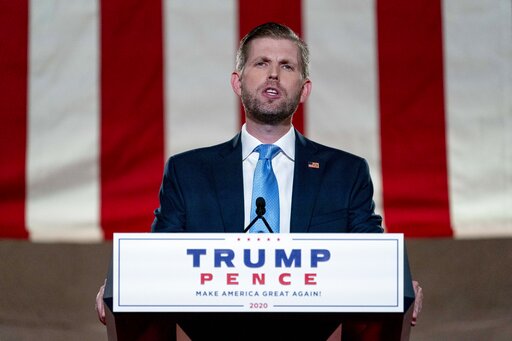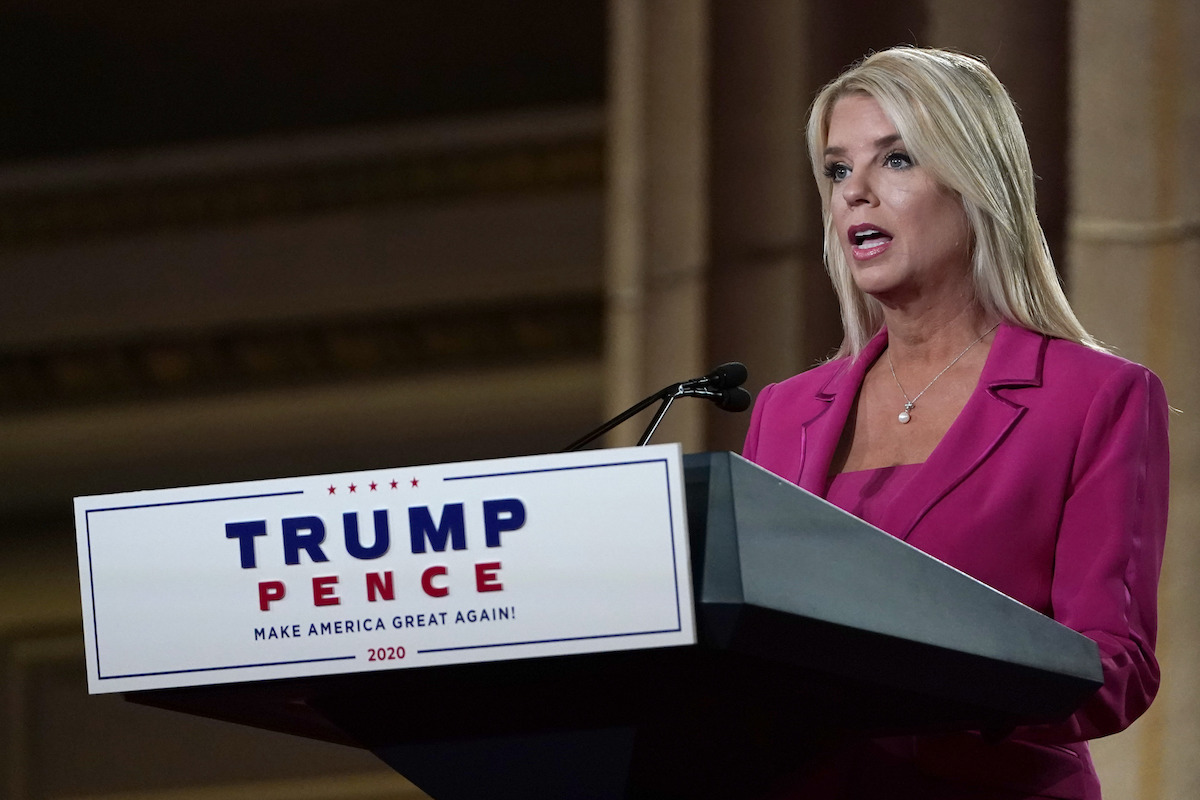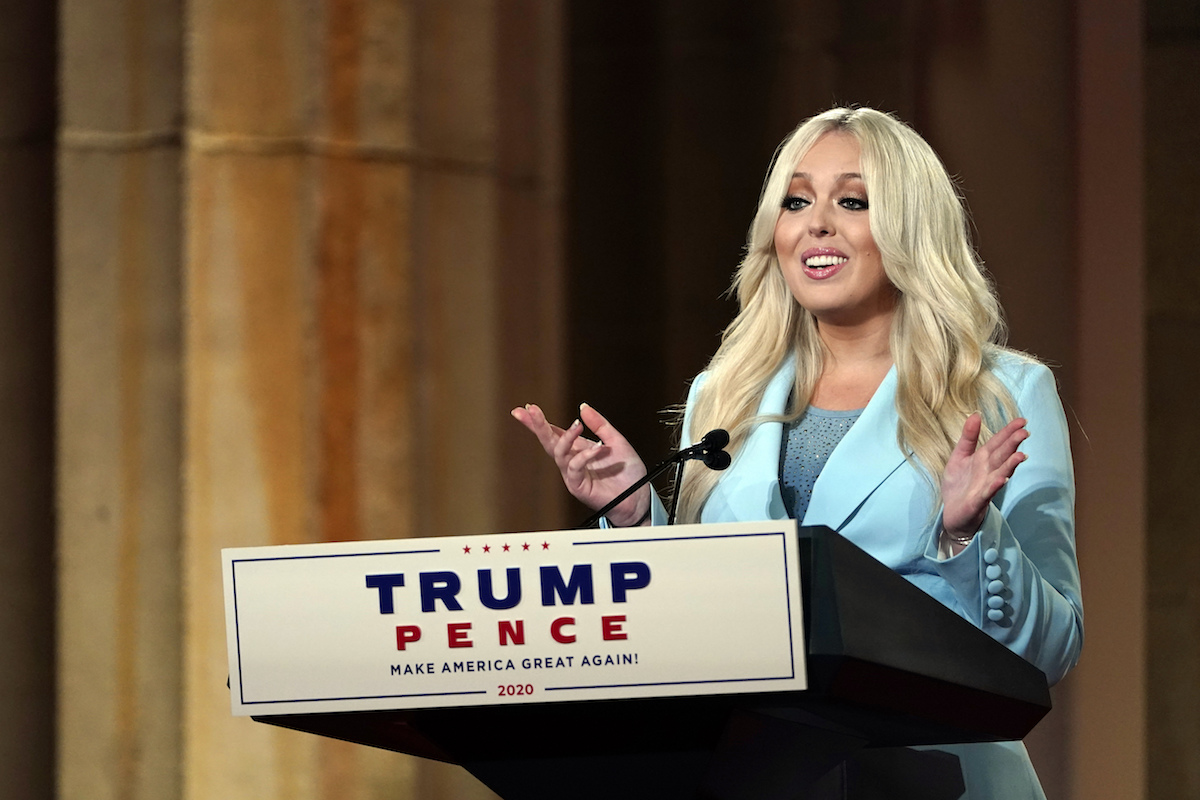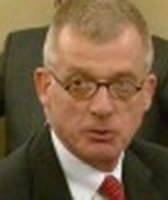Get PolitiFact in your inbox.
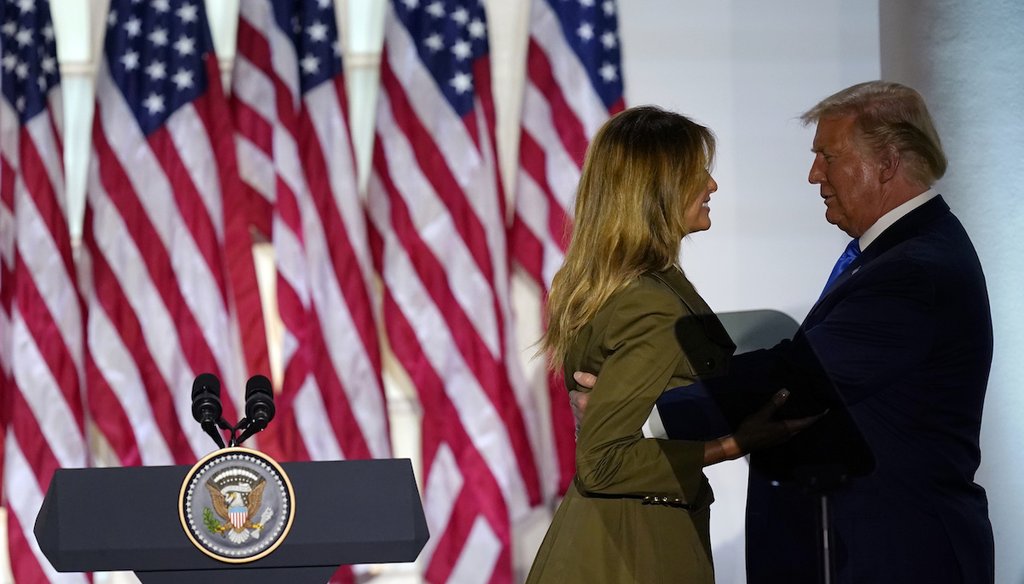
President Donald Trump joins first lady Melania Trump on stage after her speech to the 2020 Republican National Convention from the Rose Garden of the White House Aug. 25, 2020, in Washington. (AP)
If Your Time is short
- Speakers included first lady Melania Trump, Secretary of State Mike Pompeo, Trump children Eric Trump and Tiffany Trump, economic adviser Larry Kudlow and Pam Bondi.
The second night of the Republican National Convention painted a picture of a compassionate White House in action. But it also showed the blurring of long-standing traditions, and maybe laws, about not mixing politics and government.
President Donald Trump pardoned a man who robbed a Nevada bank and now runs a nonprofit. Trump conducted a small naturalization ceremony inside the White House. Mike Pompeo broke from previous secretaries of state by not only giving a convention address, but doing so from Jerusalem.
First lady Melania Trump wrapped up the night with a speech from the renovated Rose Garden, telling a largely unmasked audience seated on the lawn that her husband’s administration has been relentless in its effort to find a vaccine or treatment for COVID-19.
"Donald will not rest until he has done all he can to take care of everyone impacted by this terrible pandemic," she said.
Before ending her address, she alluded to her husband’s brash reputation. "Total honesty is what we as citizens deserve from our president," she said. "Whether you like it or not, you always know what he's thinking."
Her speech didn’t leave much work for fact-checkers, but other remarks from the president’s adult children, a former impeachment lawyer and his economic adviser did.
Experts also had plenty to say about top administration officials possibly violating the Hatch Act, a 1939 law that limits government officials from mixing political activities with their official duties.
RELATED: The RNC featured Pompeo in Jerusalem and official White House acts. Is that legal?
Here’s what we fact-checked from the RNC’s second night.
"Biden has pledged to defund the police and take away your cherished Second Amendment."
Both claims are False.
Biden has directly said he does not support defunding the police. He said that abuse of power in police departments must stop and reforms are needed. But he’s said police departments should be given the money they need to institute changes. Biden proposed an additional $300 million for community policing.
Biden’s plan to end gun violence calls for banning the manufacture and sale of assault weapons and high-capacity magazines and for the regulation of existing assault weapons under the National Firearms Act. His plan also calls for a buy back of assault weapons and high-capacity magazines. But it does not say the Second Amendment should be revoked. "It’s within our grasp to end our gun violence epidemic and respect the Second Amendment, which is limited," his plan says.
In a heated exchange with an auto worker in Detroit in March, Biden rejected the idea that he supported taking guns away from people.
"Biden has pledged to stop border wall construction and give amnesty and health care to all illegal immigrants."
Some elements of this claim are true but need clarification.
Biden has said "there will not be another foot of wall constructed" if he is elected president. "I'm going to make sure that we have border protection, but it's going to be based on making sure that we use high-tech capacity to deal with it and at the ports of entry," Biden said during an interview aired Aug. 6.
Biden says he supports a path to citizenship for an estimated 11 million people living illegally in the country; they would have to have paid taxes and pass a background check. Some argue any path is a form of amnesty. The common reference for amnesty in modern U.S. politics is the Immigration Reform and Control Act of 1986, signed by President Ronald Reagan. The law paved the way for immigrants who were in the country illegally to become lawful permanent residents if they met certain requirements, including being in the country by Jan. 1, 1982.
Biden has said that people should have access to health care, regardless of immigration status; he has not said it should be free. A task force comprised of appointees of Biden and Sen. Bernie Sanders, I-Vt. recommended that Biden extend Affordable Care Act coverage to immigrants illegally in the country who are protected from deportation under the Deferred Action for Childhood Arrivals program. It recommended allowing additional immigrants illegally in the country to also buy health insurance, without financial assistance from the government.
"My father on the other hand, delivered the largest tax cuts in American history."
False. Several bills since 1980 were larger than the 2017 tax bill, measured not only by contemporary dollars but also by inflation-adjusted dollars and as a percentage of gross domestic product, which is a measure of the size of the overall economy. In inflation-adjusted dollars, the recent tax bill is the fourth-largest since 1940. And as a percentage of GDP, it ranks seventh. We’ve summarized the tax laws here.
"A corrupt Ukrainian oligarch put Hunter on the board of his gas company, even though he had no experience in Ukraine — or in the energy sector. None. Yet he was paid millions to do nothing."
Bondi has a point that Hunter had no experience in Ukraine or the energy sector.
Despite the lack of expertise, he joined the board of Burisma beginning in 2014 when his father as vice president was publicly representing U.S. policy on the country, which had become the center of a tug-of-war between Russia and the West.
Most of the criticism we’ve found focused on the conflict of interest Hunter Biden created by accepting the position. We found no evidence to suggest Joe Biden did anything wrong or inappropriate in his official capacity as vice president.
Hunter Biden’s work attracted attention at the time. The oligarch behind the firm, Mykola Zlochevsky, faced investigations for money laundering and tax evasion. (Zlochevsky and the company have denied the allegations.)
Staff at the State Department said they expressed concerns in 2015 when Hunter Biden started serving on the board of Burisma.
The details of what Hunter did have been mysterious. Reuters, using unnamed sources, reported that Hunter weighed in during scheduled meetings but did little of substance. The report suggests he was compensated for contributing his high-profile name.
Exactly how much Hunter Biden was paid remains unclear. As a director, Biden made up to $50,000 per month some months, according to the New York Times. He left Burisma in spring 2019, around the time that the elder Biden announced his 2020 presidential run.
In 2019, the Democratic-led U.S. House of Representatives launched an impeachment inquiry into Trump for withholding aid to Ukraine while asking the government there to look into the Bidens’ activities.
We found no evidence that Hunter Biden himself was investigated by Ukrainian or American authorities for his role as a board member of Burisma.
Read more of our fact-checking of Bondi's case against the Bidens in this story.
"And if you believe in expanding quality and affordable healthcare, only President Trump, my father, signed Right to Try into law, the favored nations clause, and other actions to lower drug prices and keep Americans from getting ripped off."
This is somewhat misleading. The Right to Try law that Trump signed in 2018 law allows individuals who have life threatening conditions, have tried all approved treatment options and cannot participate in clinical trials to access unapproved treatments. It did not, however, lower drug prices.
Trump also signed an executive order on July 24, that both he has referenced as the "favored nations clause." But it has not been put into action. Nor has the text of this executive order been made public, so the details of how it would be executed are unclear. The idea of the "favored nations" proposal is that the U.S. would pay similar prices as European countries do for some Medicare Part B physician-administered drugs. This proposal has been strongly opposed by drugmakers and experts told us they were skeptical that it would actually be implemented.
While Trump has long talked about lowering drug prices as one of his top health care goals, he has made little progress in doing so, outside of issuing several executive orders that have yet to be enacted.
Says Joe Biden "voted for the Iraq War … He supported war in Serbia, Syria, Libya."
This is Mostly True.
Biden as a senator voted for resolutions that supported interventions in Iraq and Yugoslavia (Serbia and Montenegro).
As vice president, Biden publicly followed the policies of the Obama administration, which included interventions in Syria and Libya. Biden’s campaign pointed to 2016 reporting that said Biden within the White House argued against intervention in Libya.
President Donald Trump inherited "a stagnant economy" and then "rebuilt" it.
The idea that Trump inherited a weak economy from President Barack Obama and turned it into a strong one is False — and that was before COVID-19 threw the country back into a recession. In the big picture, Obama inherited the most severe recession in decades. Trump inherited a slow but steady recovery several years in the making.
For instance, for unemployment rates and median weeks of unemployment, the declines under Obama were at least as fast — if not faster — than they were under Trump, pre-coronavirus. That holds for several racial and ethnic groups as well as women. The pattern of monthly job gains was also similar under both Obama and Trump.
Inflation-adjusted wages fell for much of Obama’s first term, but they began rising again during his second term. Their path under Trump has been rising on much the same trajectory.
The poverty rate and food stamp use declined under Trump, but those declines began during Obama’s final years in office. The big declines in foreclosures, bankruptcies and bank failures occurred under Obama, with marginal advances under Trump. Even the stock market, which Trump often notes has risen to record highs on his watch, rose at roughly similar rates under both presidents.
It’s important to remember that no president has total control over the factors affecting the economy.
The pandemic "was awful. Health and economic impacts were tragic. Hardship and heartbreak were everywhere. But presidential leadership came swiftly and effectively, with an extraordinary rescue for health and safety to successfully fight the coronavirus."
To hear chief White House economic adviser Larry Kudlow say it, the pandemic is in the rearview mirror. There are states, such as Texas and Florida, where a deadly surge has eased. Nationally, however, the death toll continues to climb.
Data from the Covid Tracking Project show deaths topping 170,000. And the recent rise in deaths is only slightly less compared with the early months of the pandemic.
The Institute for Health Metrics and Evaluation at the University of Washington estimates that the number of deaths will exceed 300,000 by Dec. 1. That would be nearly double the deaths seen so far.
Kudlow offered an optimistic picture of the economic recovery and the growth to come, telling Americans to expect 20% growth in a "V-shaped recovery" in the second half of the year.
But much hinges on the course of the virus. Current trends show an ongoing threat to the prosperity Kudlow described.
"Margaret Sanger was a racist who believed in eugenics. Her goal when founding Planned Parenthood was to eradicate minorities."
This statement is misleading. Sanger has been routinely criticized for supporting eugenics — the belief of improving the population by controlled breeding for desirable characteristics. But historians and scholars who have studied Sanger’s life say her opinions concerned public health, and were not specific to race.
The basic concept that humanity could be improved by selective breeding was firmly held belief for many in the years before World War II. Winston Churchill, Herbert Hoover, Theodore Roosevelt, George Bernard Shaw and H. G. Wells all supported the eugenics movement. The philosophy fell out of favor after Nazis adopted eugenics to support exterminating non-Aryan races.
Still, Planned Parenthood recently announced that it would remove Sanger’s name from its Manhattan Health Center over her eugenics beliefs, and there is some disagreement about her views and whether they should be reevaluated amid protests against systemic racism and a pandemic that has disproportionately affected minorities.
Sanger was a birth control activist, which means that she wanted women to be able to avoid unwanted pregnancies. The historical record shows she worked for women of all classes and races to have that choice.
Those who call Sanger a racist often cite her work on what was called the Negro Project, an effort that started in 1939 that brought birth control services (but not abortion) to Black communities in the south. Black leaders such as W.E.B. DuBois and Mary McLeod Bethune, founder of the National Council of Negro Women, were members of its advisory council.
Louis Jacobson, Amy Sherman, Samantha Putterman, Jon Greenberg, Miriam Valverde and Kaiser Health News reporter Victoria Knight contributed to this report. Photos by the Associated Press.
It’s never been more important to know the facts…
2020 hasn’t turned out like any of us expected. At PolitiFact, we thought we’d be fact-checking a spirited political debate about the economy, health care and immigration ahead of voting in November.
We’re still doing that, of course, but we also find ourselves in the middle of the worst public health crisis in a century.
The coronavirus pandemic has been a call to action for all fact-checking newsrooms like ours to root out harmful hoaxes because, and we can say this with certainty, every single person in the U.S. is affected by the spread of COVID-19 and misinformation around it.
PolitiFact is not immune from the economic uncertainty that the pandemic brings. We’re doing everything in our power to expand our coverage of both COVID-19 and the 2020 election. Without a paywall, we ask readers like you to support our newsroom as we continue to provide you with the truth.
Thank you for reading PolitiFact.
Our Sources
See fact-checks.
